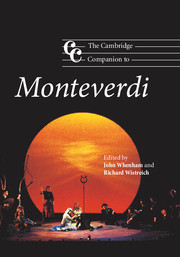Book contents
- Frontmatter
- Dedication
- Contents
- List of illustrations
- Notes on contributors
- Preface
- Chronology
- 1 Approaching Monteverdi: his cultures and ours
- 2 Musical sources
- 3 A model musical education: Monteverdi's early works
- INTERMEDIO I ‘Ecco mormorar l'onde’ (1590)
- 4 Monteverdi at Mantua, 1590–1612
- 5 Spaces for music in late Renaissance Mantua
- 6 The Mantuan madrigals and Scherzi musicali
- INTERMEDIO II ‘Ahi, come a un vago sol cortese giro’ (1605)
- 7 Orfeo (1607)
- 8 The Mantuan sacred music
- INTERMEDIO III ‘Laetatus sum’ (1610)
- 9 Music in Monteverdi's Venice
- 10 The Venetian secular music
- INTERMEDIO IV Lamento della ninfa (1638)
- 11 The Venetian sacred music
- INTERMEDIO V Magnificat SV281 (1641)
- 12 Monteverdi's late operas
- INTERMEDIO VI Il ritorno d'Ulisse (1640), Act V, scene 10
- 13 Monteverdi studies and ‘new’ musicologies
- 14 Monteverdi in performance
- Notes
- Bibliography
- Selected discography
- The works of Monteverdi: catalogue and index
- Index of titles and first lines
- Index of names and subjects
11 - The Venetian sacred music
Published online by Cambridge University Press: 28 September 2011
- Frontmatter
- Dedication
- Contents
- List of illustrations
- Notes on contributors
- Preface
- Chronology
- 1 Approaching Monteverdi: his cultures and ours
- 2 Musical sources
- 3 A model musical education: Monteverdi's early works
- INTERMEDIO I ‘Ecco mormorar l'onde’ (1590)
- 4 Monteverdi at Mantua, 1590–1612
- 5 Spaces for music in late Renaissance Mantua
- 6 The Mantuan madrigals and Scherzi musicali
- INTERMEDIO II ‘Ahi, come a un vago sol cortese giro’ (1605)
- 7 Orfeo (1607)
- 8 The Mantuan sacred music
- INTERMEDIO III ‘Laetatus sum’ (1610)
- 9 Music in Monteverdi's Venice
- 10 The Venetian secular music
- INTERMEDIO IV Lamento della ninfa (1638)
- 11 The Venetian sacred music
- INTERMEDIO V Magnificat SV281 (1641)
- 12 Monteverdi's late operas
- INTERMEDIO VI Il ritorno d'Ulisse (1640), Act V, scene 10
- 13 Monteverdi studies and ‘new’ musicologies
- 14 Monteverdi in performance
- Notes
- Bibliography
- Selected discography
- The works of Monteverdi: catalogue and index
- Index of titles and first lines
- Index of names and subjects
Summary
Monteverdi's appointment in 1613 as maestro di cappella of S. Marco, Venice, brought him financial security in a post that also allowed him a good deal of freedom to accept commissions elsewhere, both in and outside the city. His initial salary of three hundred ducats was raised by the Procurators of S. Marco to four hundred in August 1616,1 making him, in his own words
certainly not rich, but neither am I poor; moreover, I lead a life with a certain security of income until my death, and furthermore I am absolutely sure of always having it on the appointed pay-days, which come every two months without fail. Indeed, if it is the least bit late, they send it to my house [in the chancellery of S. Marco]. Then as regards the cappella I do as I wish, since there is the assistant choirmaster … and there is no obligation to teach.
(Letter of 10 September 1627 to Alessandro Striggio)Monteverdi's reference here to his assistant choirmaster is a reminder that he was not alone in shouldering the responsibilities of providing music for S. Marco. He inherited, and was later able to appoint, assistants who were not only performers, but also able composers of sacred music – Marc'Antonio Negri (singer and assistant choirmaster from 1612), Alessandro Grandi (singer from 1617, assistant choirmaster from 1620) and Giovanni Rovetta (singer from 1623, assistant choirmaster from 1627).
- Type
- Chapter
- Information
- The Cambridge Companion to Monteverdi , pp. 199 - 218Publisher: Cambridge University PressPrint publication year: 2007



